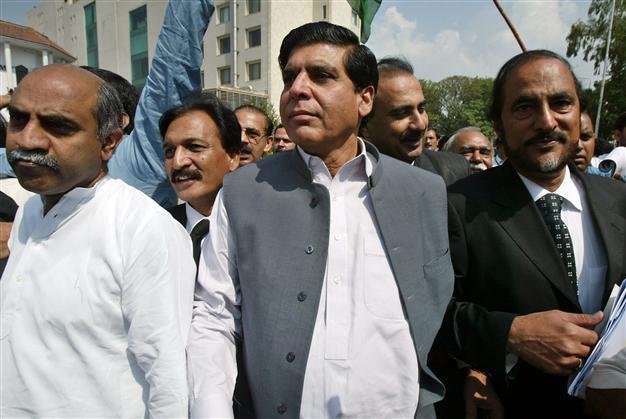Pakistan forced into new PM nomination
ISLAMABAD - Agence France-Presse

In this photograph taken on September 27, 2007, leaders of Pakistani self-exiled former premier Benazir Bhutto's Pakistan People's Party (PPP) Babar Awan (R) and Raja Pervez Ashraf (C), arrive at the election commission office to file nomination papers for the forthcoming presidential election in Islamabad. AFP photo
Pakistan's main ruling party Friday nominated Raja Pervez Ashraf as prime minister and said it was heading towards elections, forced onto the back foot after a court issued an arrest warrant for its first candidate.The lower house of parliament is scheduled to meet at 1230 GMT to elect a new premier in a bid to end a political crisis sparked by the Supreme Court's dismissal of premier Yousuf Raza Gilani for contempt.
The chaos is the culmination of a standoff between the Pakistan People's Party (PPP) government, dogged by corruption allegations, and the judiciary, accused of working behind the scenes with the military and the political opposition.
It exposes damaging power struggles in the nuclear-armed country, where millions of people are enraged by appalling power cuts, and the United States is increasingly impatient over havens for Al-Qaeda-linked militants.
"Raja Pervez Ashraf is our candidate," senior party official Syed Khurshid Shah told a news conference, saying that the government was heading towards an election. Its five-year mandate expires in early 2013.
"This is election year and we are going towards elections," Shah said, referring to the national assembly year, which starts in June.
"If we have committed some mistakes or did not fulfill our manifesto, then the decision should be left to the people of Pakistan." Ashraf, who served as information technology minister until Tuesday, was originally named as a "cover" candidate when President Asif Ali Zardari picked textiles minister Makhdoom Shahabuddin as his preferred choice.
Dogged by allegations of corruption from his tenure as water and power minister, his appointment is likely to prove controversial.
Some analysts had expected the party to favour information minister Qamar Zaman Kaira, who is considered to have more political clout and a clean record.
On Thursday, an anti-narcotics court took the unusual step of issuing an arrest warrant for Shahabuddin over a drugs scandal.
Critics shrugged off the warrant as politically motivated, but analysts suggested that it could signal that the powerful military, considered the chief arbiter of power in Pakistan, were unprepared to back Shahabuddin.
Shahabuddin, was briefly finance minister during the 1993-1996 premiership of Benazir Bhutto, Zardari's wife, who was assassinated in 2007.
But it was his stint as health minister that led to his arrest warrant over the alleged illegal import of a drug in 2010.
Judge Shafqatullah Khan also issued a warrant for Ali Musa Gilani, son of the outgoing premier over the same scandal.
An anti-narcotics investigator told the court in Rawalpindi, the headquarters of the army, that evidence given by Shahabuddin and Gilani junior had "not convinced" investigators of their innocence.
Political analyst Hasan Askari said suspicion would fall on the military for being behind the warrant, saying it was unusual for junior courts to intervene against senior politicians without being pushed.
"It appears that the army wants to wind up the present government but without actually coming into power," Askari told AFP.
Four other politicians, including two from the opposition, are also standing in what is considered a largely symbolic move as the PPP leads a majority in the assembly.
Gilani, who became prime minister after the PPP won elections in 2008 ending nearly a decade of military rule, was dismissed for refusing to ask Swiss authorities to reopen corruption cases against Zardari.
The new premier will face the same pressure to write to the Swiss, sparking speculation that elections due early next year could be brought forward.
There has been criticism of the judges' interference but other analysts pointed out the change of prime minister will have little tangible effect on policy or the longevity of the government.
Gilani's disqualification was the culmination of a showdown between the judiciary led by a popular chief justice, and a weak, ineffective government that critics say has been politicised at best, or vendetta-driven at worst.
The cases against Zardari date to the 1990s, when he and Bhutto are suspected of using Swiss banks to launder $12 million allegedly paid in bribes by companies seeking customs contracts.
The Swiss shelved the cases in 2008 when Zardari became president.
















